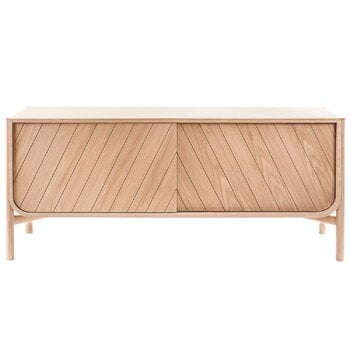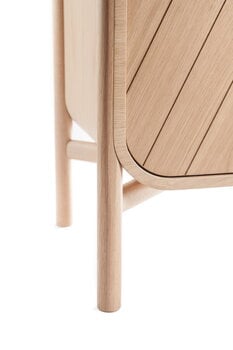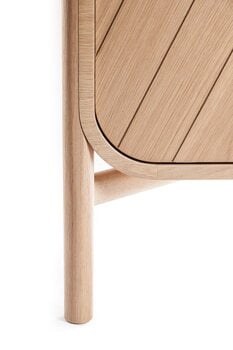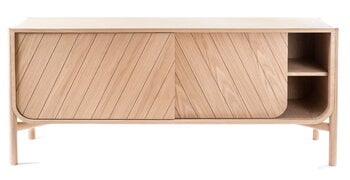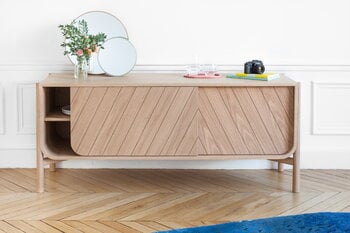Hartô’s Marius sideboard, designed by Pierre-François Dubois, is an elegant piece of storage furniture suitable for a variety of spaces. Inspired by nautical life, the shape of the sideboard carries references to a ship’s hull while the sliding doors’ decorations resemble its sails.
Marius sideboard, oak
Hartô
Description
Hartô’s Marius sideboard, designed by Pierre-François Dubois, is an elegant piece of storage furniture suitable for a variety of spaces. Inspired by nautical life, the shape of the sideboard carries references to a ship’s hull while the sliding doors’ decorations resemble its sails.
Product details (8)
- Colour
- Oak
- Width
- 155–185 cm
- Depth
- 45 cm
- Height
- 65 cm
- Frame material
- Oak veneered MDF (non-gloss varnish)
- Base material
- Oak
- Door material
- Oak veneered MDF (non-gloss varnish)
- Notes
- Adjustable shelf. Contains two holes for cables in the back.
- Product ID
Designer
Pierre-François Dubois is a Paris-based designer with a background in industrial design. Besides several French design schools, Dubois has also studied at Helsinki’s Aalto University, and the time spent in Finland has given his work a strong respect for natural materials and clean lines. Since 2013, Dubois has been a member of Hartô's team of artistic direction.
View all productsReviews (2)
5
Based on 2 reviews
-
A
anonyymi
Turku, Finland
265 days ago
-
K
Kirsi K
Joroinen, Finland
Senkki on aivan ihana. Hienompi kuin kuvissa. Se oli melkein koottu valmiiksi. Laitoin vain ovet paikalleen ja senkki oli valmis.👍👍👍
97 days ago
Sustainability
The Product Sustainability Framework, our criteria of sustainable design, helps you find the most sustainable products in our selection. Read below which sustainability criteria this product has met.
Working conditions & labour 9/9
-
Equal opportunities for all employees
-
Commitment to UN Global Compact, fair compensation for all employees
-
Corporate responsibility requirements defined and communicated for suppliers
-
Systematic work for improved inclusion and well-being in the workplace
-
Transparent supply chain
-
Suppliers' compliance to a code of conduct ensured
-
Direct suppliers audited and certified
-
Compliance to the UN Guiding Principles on Business and Human Rights ensured in the supply chain
-
Support for community involvement in the supply chain
Eco-friendly production 7/9
-
Fair and resource-wise water-use in production
-
No incineration or landfilling of returned items
-
No use of endangered species as materials
-
No direct environmental emissions or waste (excl. GHGs) from production
-
The sustainability of direct suppliers' production is addressed and monitored
-
Material-efficient and ecological packaging
-
No potentially harmful chemicals used in own production
Climate impact 4/8
-
Company's direct greenhouse gas emissions identified and commitment to reduction
-
Product's carbon impact identified and commitment to reduction
-
Guidance on energy- and eco-efficient use of the product
-
Contribution to climate initiatives beyond the brand’s direct operations
Sustainable materials 3/6
-
Sustainable and long-lasting material choices
-
No harmful or hazardous substances
-
Responsible raw material sourcing and production
Circular design 4/5
-
High aesthetic quality promoting long-term use of the product
-
Technically durable product design and material choices
-
Design for enduring life-long quality
-
Design and support for product maintenance, repair and upgradability

